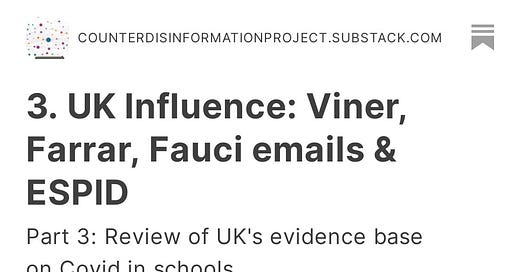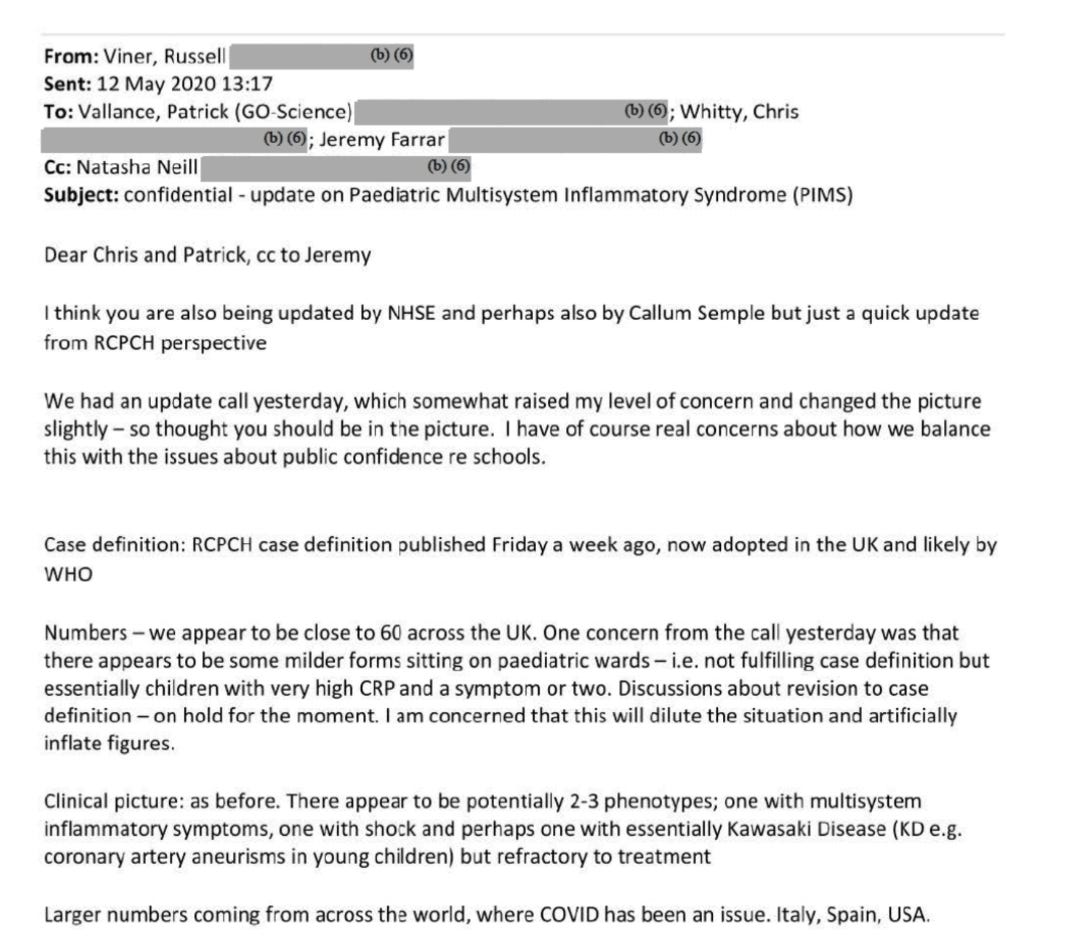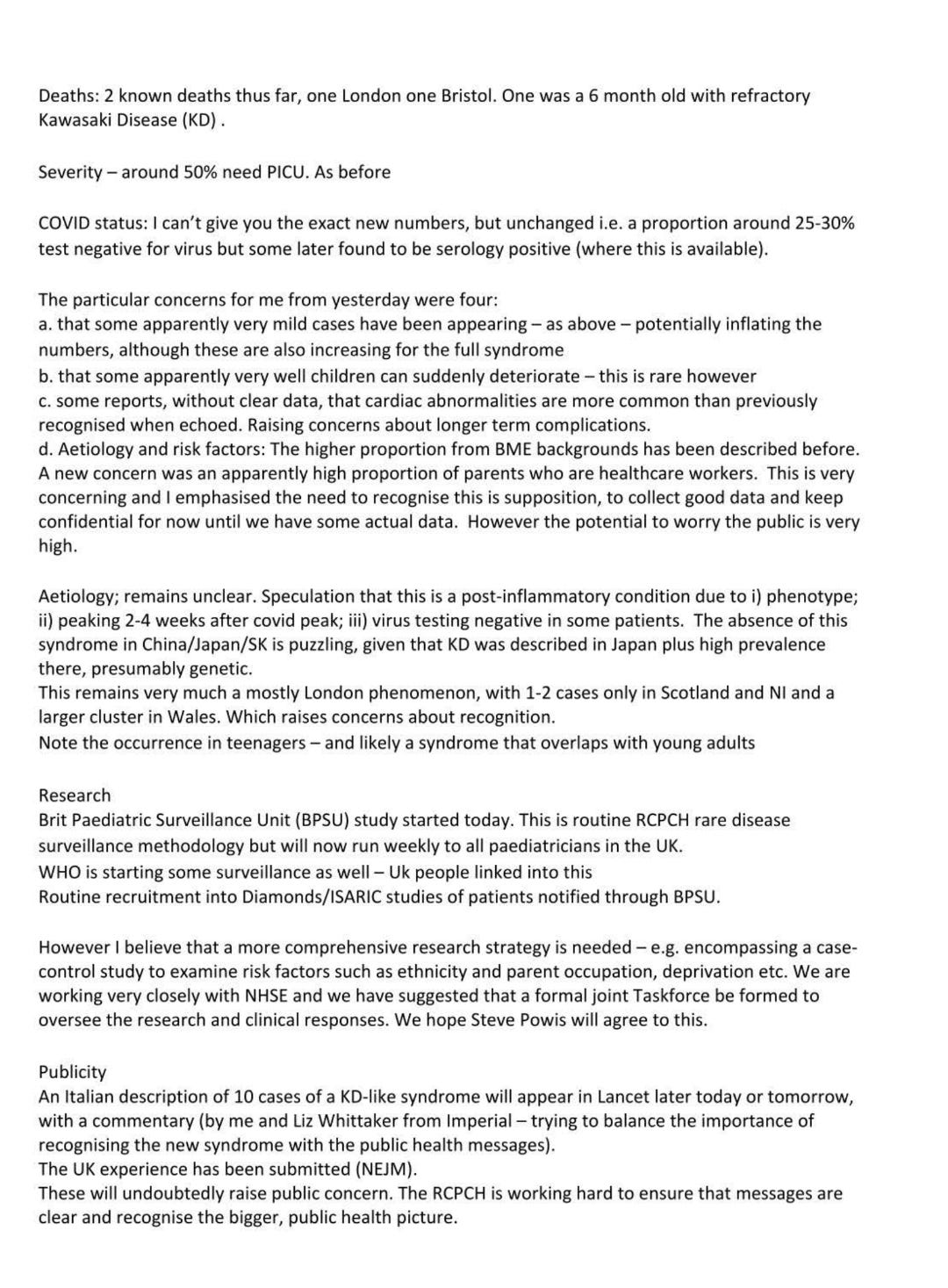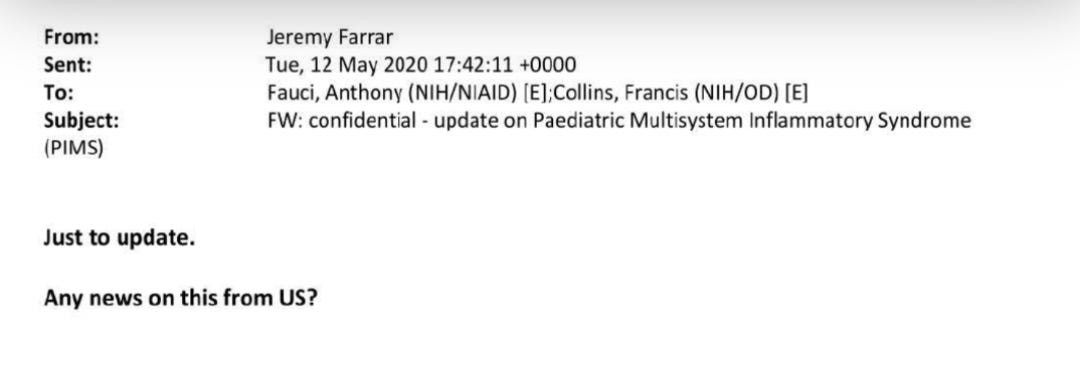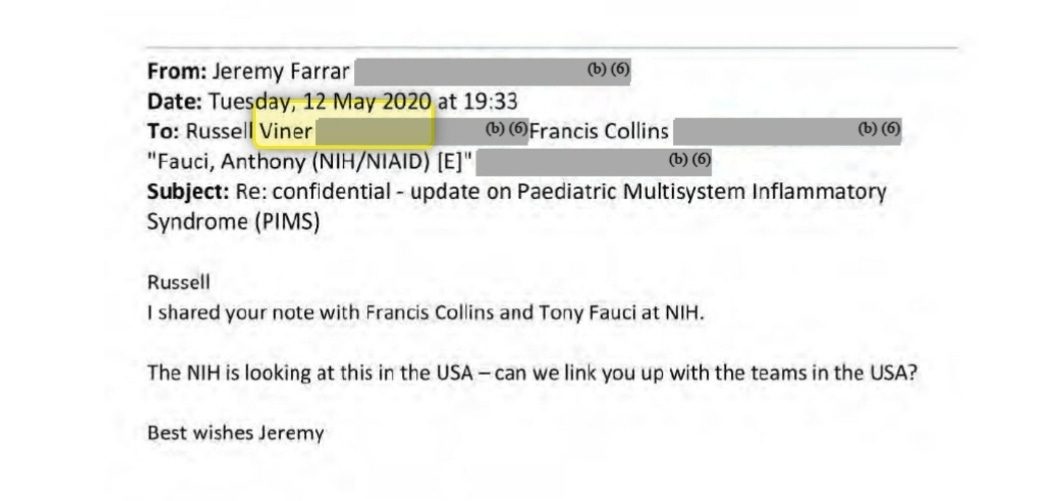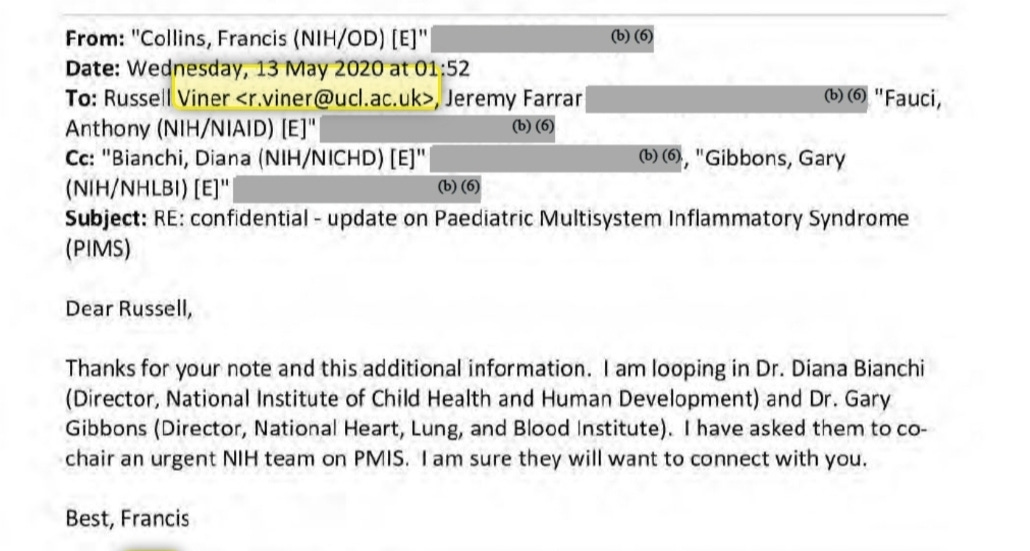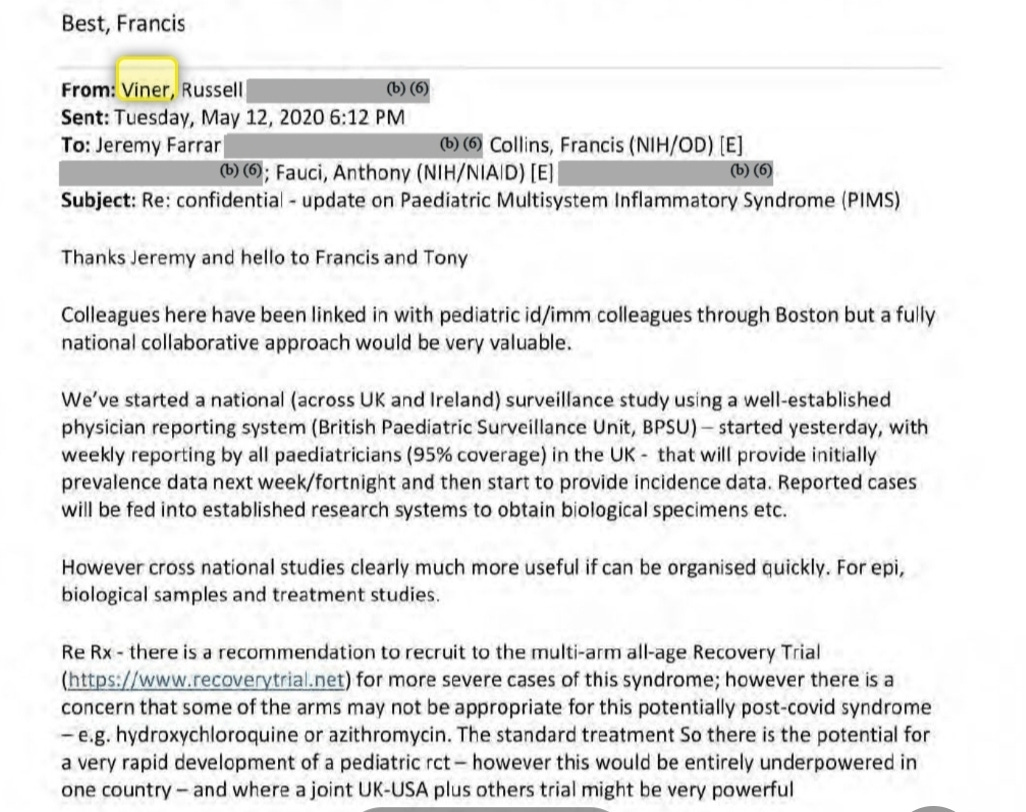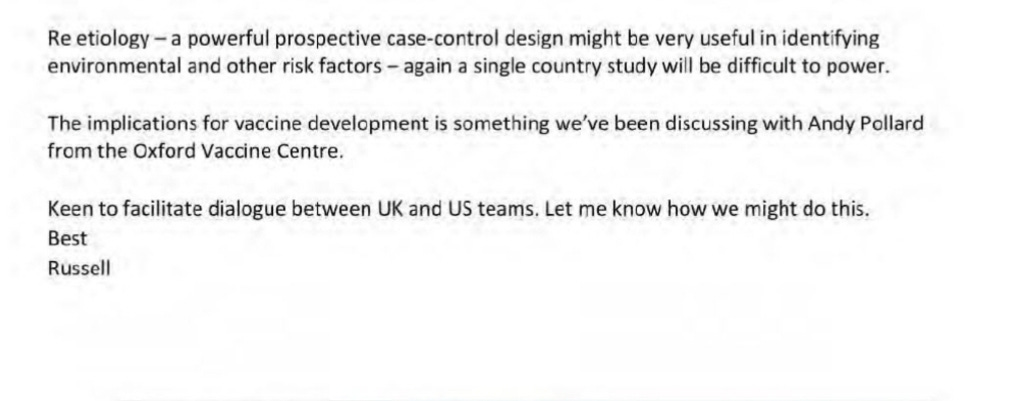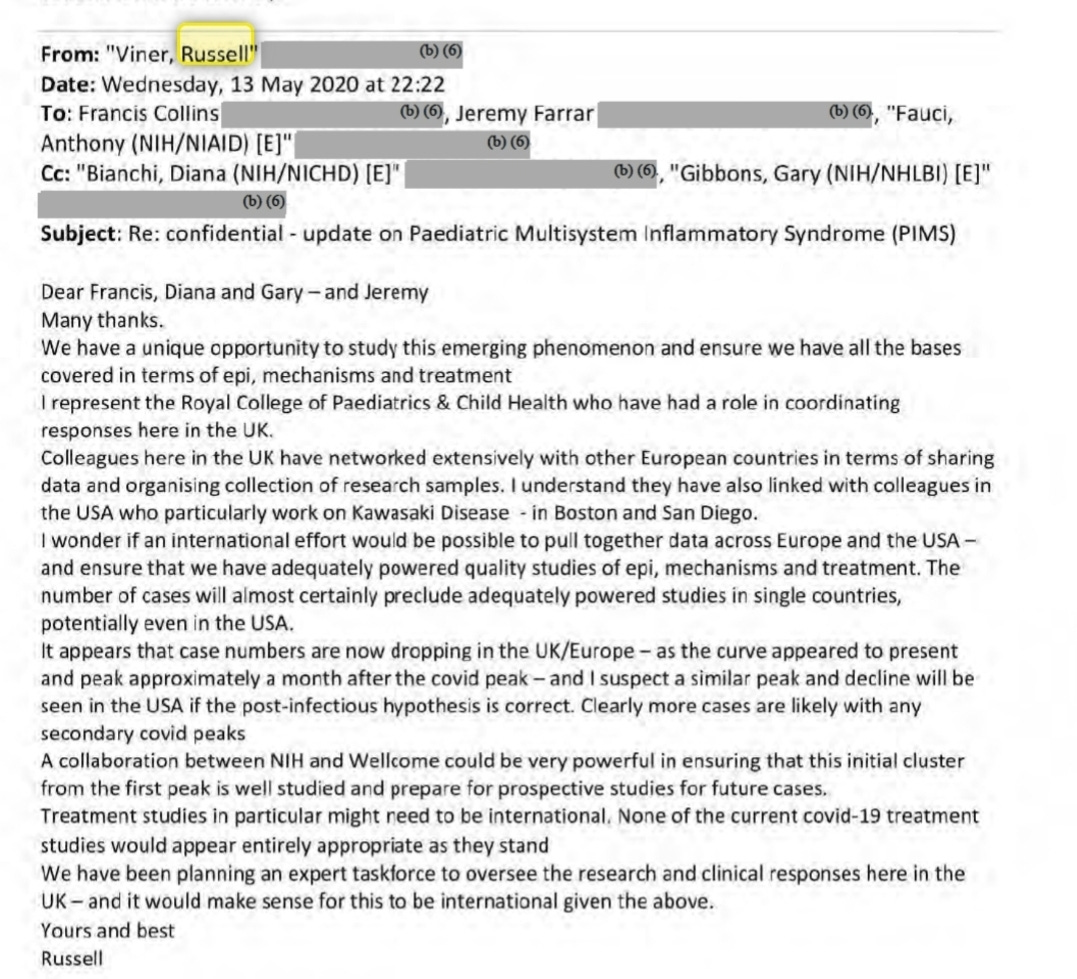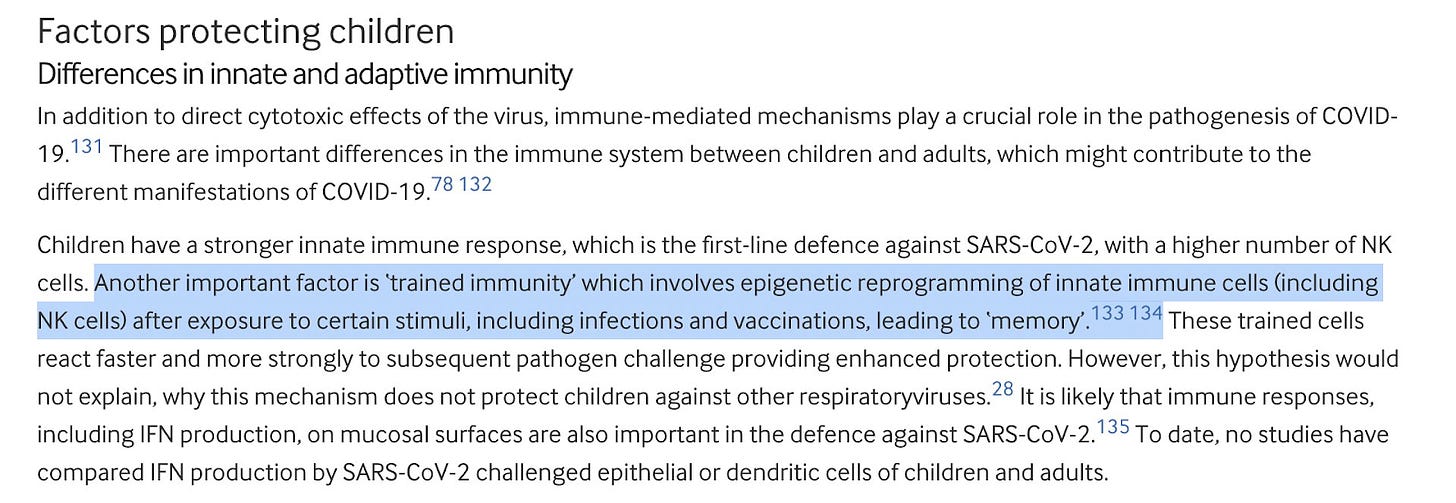3. UK Influence: Viner, Farrar, Fauci emails & ESPID
Part 3: Review of UK's evidence base on Covid in schools
Part 3 takes a look at some of the ways those guiding the government’s evidence base on covid in schools collaborated with the US and European partners.
May 2020
After a long FOI fight, Jimmy Tobias, an independent US reporter received a batch of emails from the first half of 2020 between Antony Fauci in the US and Jeremy Farhar in the UK.
The emails show Russel Viner reached out to Fauci via Farhar citing the work he was already doing with RCPCH and UK authorities in an offer to collaborate with the US’ National Institute of Health; as in the Elsevier piece in March 2020 Viner focused on public messaging.
This was after cases of PIMS, a severe inflammatory condition that occurs mainly in younger children post infection, it had already caused some deaths by May 2020. There were around fifty confirmed deaths from PIMS in the UK by the start of 2023. In regards to new evidence on PIMS that Viner said raised his level of concern, he also had “real concerns about how we balance this with the issues of public confidence re schools.”
The issue of public confidence is a recurring theme in Viner’s email to Fauci. He suggested a narrower definition of PIMS so “not to dilute the situation or inflate numbers” recognising larger numbers were coming from other countries.
Viner told Fauci he had concerns cardiac abnormalities which might lead to longer term complications were more common than previously recognised . He was also “very concerned” by the impact of infection on a higher proportion of children from BME backgrounds and the children of healthcare workers, but emphasised the need to keep this confidential until there was more data. “The potential to worry the public is very high.”
On the subject of an Italian description of PIMS Viner explained he had written a commentary with Liz Whittaker in The Lancet which he said was “trying to balance the importance of recognising the new syndrome with the public health messages”, this suggests the public messaging was focused on calming concerns.
“This will undoubtedly raise public concern. The RCPCH is working hard to ensure that messages are clear and recognise the bigger, public health picture.”
It would be interesting to know what Viner thought the bigger picture looked like but he
was clearly concerned the wrong messaging could damage public confidence in reopening schools, however what is missing from the emails and Viner’s work in spring 2020 are any suggestions on how to reduce transmission in schools, instead messaging and monitoring was the priority.
The emails
Viner writing to CMO Chris Whitty, CSO Patrick Vallance and SAGE member Jeremy Farrar who runs the influential Wellcome Trust.
Farrar forwards the email to Fauci and members of the US National Institute of Health.
Viner suggests collaboration between RCPCH and NIH. It's interesting that Viner cites the excellent paedatric reporting system in the UK which in theory should have meant the UK was well placed to monitor long covid in children, instead the UK has relied on surveys of symptoms based on confirmed positive tests to measure change over time. Little has been published regarding physical examination of those children who continue to suffer.
While the UK has often been an outlier, the RCPCH has networked extensively with paedatricians in other countries.
ESPID
Thanks to @themisluv_vis for their research on ESPID
The European Society for Paediatric Infectious Diseases is a foundation whose purpose is “the promotion of science and research, education and public health in the field of paediatric infectious diseases”. It organises various events and participates in the training of health professionals by sponsoring, for example, the ADVAC, a training programme in vaccinology. ESPID also holds annual congresses, and provides grants and fellowships to facilitate information exchange, education and research. Through its Collaborative Research Meeting Scheme it funds projects conducted by members of more than one European nation, and it’s Fellowship Awards provide funding for a considerable number of basic and clinical research projects. The Pediatric Infectious Disease Journal is ESPID’s own official journal.
ESPID events have been attended by many specialists who have had a relaxed attitude to covid infections in children, defended the opening of schools without preventative measures and also questioned the need to vaccinate children against covid.
The UK members on ESPID’s Board and its International Board appear to have been influential in ESPID’s approach to covid. Symposiums at the October 2020 included Shamez Ladhani PHE clinical lead for covid in children, Andrew Pollard chair of the JCVI (who excused himself from the position due to his role in the Oxford vaccine, but still presented information in committee meetings) and Adam Finn JCVI and chair of the WHO European Technical Advisory Group of Experts on Immunisation and an ex-officio member of the WHO Strategic Advisory Group of Experts.
For resources on covid the ESPID website linked to the covid resources page of Don't Forget the Bubbles led by Alaisdair Munro. See Part 2 of this review for more details.
What is noticeable with many papers used to argue for allowing the mass infection of children is how what is a relatively small pool of authors, particularly in 2020 pre-vaccine, also relied on quoting a small number of recurring papers, self citing multiple papers is also common.
For instance Dimitri Van der Linden of the Netherlands who gave a symposium at ESPID 2020 produced a paper called "Urgent need to develop evidence based Covid-19 recommendations for primary schools" references include.
June 2020, Children are not Covid-19 super spreaders: time to get back to school by two individuals from Southampton University, Alasdair Munro (RCPCH, Don’t Forget the Bubbles), Saul Faust
September 2020, It’s time to put children and young people first during the global covid-19 pandemic, also by Alaisdair Munro and Saul Faust
December 2020, Covid-19 in children: current evidence and key questions, also by Alasdair Munro
A recurring theme of papers from presenters at ESPID 2020 was talk of the robust nature of children's immune systems and innate immunity. The concept of Immunity Debt comes from papers produced by those involved in ESPID which will be covered in more detail elsewhere.
From "Why is COVID-19 less severe in children?" by Petra Zimmermann and Nigel Curtis, December 2020.
ESPID Board
Delane Shingadia, UK President
Oana Falup-Pecurariu, Romania Secretary
Johannes Trueck, Switzerland Treasurer
Nigel Curtis, Australia Board Member
Vana Papaevangelou, Greece Board Member
Hermione Lyall, UK Board Member
Robin Marlow, UK Young ESPID Rep
Fani Ladomenou, Greece Young ESPID Rep
ESPID International Board
Chairs:
Annemarie van Rossum, the Netherlands
Pieter Fraaij, the Netherlands
International Scientific Committee Members:
Adam Finn, UK
Adilia Warris, UK
Andrew Pollard, UK
Asgeir Haraldsson, Iceland
Delane Shingadia, UK
Federico Martinon Torres, Spain
George Syrogiannopoulos, Greece
Goran Tešović, Croatia
Hanna Nohynek, Finland
Johannes Trueck, Switzerland
Klara Posfay Barbe, Switzerland
Lise Jensen, Denmark
Maria Tsolia, Greece
Marko Pokorn, Slovenia
Nicole Ritz, Switzerland
Nigel Curtis, Australia
Olof Hertting, Sweden
Pablo Rojo, Spain
Philipp Henneke, Germany
Saul Faust, UK
Shamez Ladhani, UK
Theoklis Zaoutis, USA
Ulrich Heininger, Switzerland

